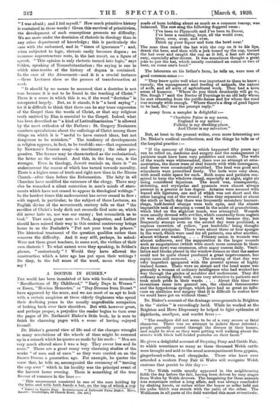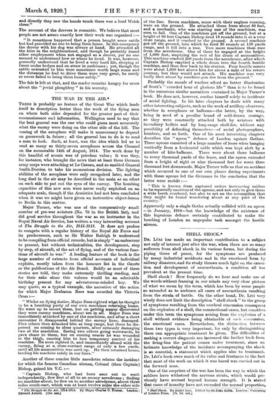A DOCTOR IN SUSSEX.* PRE world has been inundated of
late with books of memoirs. " Recollections of My Childhood," " Early Days in Wessex " or Essex, "Mercian Memories," or "Day-Dreams from Dorset" have appeared by the score, and we are most of us apt to look with a certain suspicion at these elderly Orpheuses who spend their declining years in the usually unprofitable occupation of looking back over their shoulders. But with however great, and perhaps proper, a prejudice the reader begins to turn over the pages of Dr. Nathaniel Blaker's little book, he is sure to finish its charming pages with a sense of having enjoyed himself.
Dr. Blaker's general view of life and of the changes -Wrought in many revolutions of the wheels of time might be summed up in a remark which he quotes as made by his uncle : " Men are very much altered since I was a boy. They swear less and lie more." There are a great many very charming studies of the works " of men and of oxen " as they were carried on on the Sussex Downs a generation ago. For example, he quotes the verse that, he tells us, accompanied the ceremony of " turning the cup over " which in his locality was the principal event of the harvest home evening. There is something of the true flavour of romance in the lines :- " This amusement consisted in one of the men holding by the brim and with both hands a hat, on the top of which a cup • sussez in Bygone Days. Reminiscences of Nathaniel Paine Blaker. Hove. suss:: Oombridges, 66 Church Road. [6a. net.] made of horn holding about as much as a common teacup, was balanced. The rest sang the following doggerel verse : ' I've been to Plymouth and I've been to Dover, I've been a rambling, boys, all the world over, Qver, over, over, and over, Drink up your liquor and turn the bowl over.' The man then raised the hat with the cup on it to his lips, drank the beer, and then with a jerk tossed up the cup, turned the hat over and caught the cup as it fell, a feat not always easy, especially after dinner. It was sometimes thought a great joke to put the hat, which usually contained an ounce or two of beer, on some one's head."
The labourers on his father's farm, he tells us, were men of good common-sense :— " They knew quite well what was important to them to know ; namely, the management and feeding of animals, the nature of soils, and all sorts of agricultural work. They had a keen sense of humour. ' Where do you think drunkards will go to, Mrs. Sough ? ' said the Rector of Poyninga to an old lady whom he met returning from the pnblic-house and for whom the road was scarcely wide enough. ' Where there's a drop of good liquor to be had, Sir,' was the prompt reply."
A poesy from a sampler is delightful :— " Charlotte Paine is my name, England is my nation ; Fulking is my dwelling-place, And Christ is my salvation."
But, at least to the present writer, even more interesting are Dr. Blaker's medical recollections, and the things he tells us of the hospital practice :- " If the memory of things which happened fifty years ago can be relied on, medicine and surgery and the management of patients must have been very primitive and crude. The walls of the wards were whitewashed, there was no attempt at orna- mentation, the floors were of deal boards with wide interspaces, and these were occasionally scrubbed. The food was good and stimulants were prescribed freely. The beds were very close, with small cubic space for each. Both nurse and patients con- spired to keep the windows closed, especially at night, night air being considered injurious. The smell was, consequently, sickening, and erysipelas and pyaemia were almost always present in a greater or less degree. Arteries were secured with waxed silk ligatures, one end of which was out short and the other hanging out of the wound ; when they separated at about the ninth or tenth day there was frequently secondary haemor- rhage, half-healed stumps were torn open, and the almost impossible task of securing a vessel in the midst of granulations, which bled on the slightest touch, was attempted. Wounds were usually dressed with wet lint, which constantly from neglect (it was almost impossible to keep it wet) became dry, but frequently stumps even on the second day were poulticed, a copious excretion of yellow, ' pus laudabile,' bemg thought to prevent erysipelas. There were about three or four sponges in the ward, *hich were used for all patients, one after another, almost without washing. . . . Primary }anion in wounds was almost unknown, and the suppuration in the larger wounds such as amputations (which were much more common in those days than now) was enormous, often many ounces daily. Venti- lators and blocks placed in the window-frames so that the sashes could not be quite closed produced a great improvement, but septic cases still occurred. . . . The nursing of that day was very imperfect Compared with the present system of highly trained nurses. Theis were no sisters and the head nurse was generally a woman of ordinary intelligence who had worked her *ay through the grades of scrubber and undernurse. They did ordinary nursing fairly well, were very attentive to patients and took much pride in their wards. . . . About this time two inventions came into general use, the clinical thermometer and the hypodermic syringe, which lave had so great an influ- ence on medicine and surgery that it is difficult to realize how we could have got on without them."
Dr. Blaker's account of the drainage arrangements in Brighton in the " sixties " is exceedingly lurid. While he worked at the Brighton and Hove Dispensary he helped to fight epidemics of diphtheria, smallpox, and scarlet fever :— " The smallpox did not seem to be of a very severe or fatal character. There was no attempt to isolate those infected ; people generally passed through the disease in their homes, and might be seen as they were getting well walking about the streets with black half-healed pustules on their faces."
He gives a delightful account of Steyning Pony and Cattle Fair, to which sometimes as many as three thousand Welsh cattle were brought and sold to the usual acoompaninient from gypsies, gingerbread-sellers, and cheapjacks. Those who have ever attended a modern Pony Fair in Wales will recognize Welsh customs that persist to this day :— " The Welsh cattle usually appeared in the neighbouring fields the day before the fair, having been driven by easy stages from Wales by Welsh drovers. The bargaining for these animals was sometimes rather a long affair, and was always concluded by shaking hands, or rather either the buyer or seller held out his palm which was struck with the palm of the other. The Welshmen in all parts of the field watched this most attentively.
and directly they saw the hands touch there was a loud Welsh cheer."
The account of the drovers is romantic. We believe that most people are not aware exactly how their work was organized :- " It sometimes happened that a person bought some cattle but had provided no one to bring them home. In this emergency the drover with his dog was always at hand. He attended all the fairs in the neighbourhood, and though he probably found other employment when not engaged as a drover, yet no one seemed to understand how or where he lived. It was, however, generally understood that he lived a very hard life, sleeping at times under hedges and on straw in outhouses ; yet, though the cattle entrusted to him were sometimes worth large sums and the distances he had to drive them were very great, he rarely or never failed to bring them home safely."
The fair is left at that, and the reader remains hungry for more about the " jovial ploughboy " in his serenity.











































 Previous page
Previous page